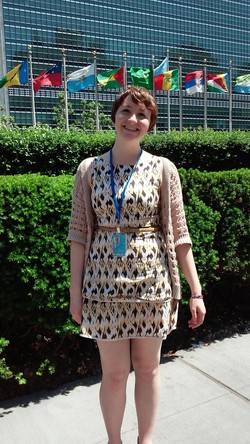 This summer, I interned at the Presbyterian Ministry at the United Nations, aided by a scholarship from the Peace, Justice, and Hunger Working Group. At the Ministry, I got to see the intersection of faith and international politics in action.
This summer, I interned at the Presbyterian Ministry at the United Nations, aided by a scholarship from the Peace, Justice, and Hunger Working Group. At the Ministry, I got to see the intersection of faith and international politics in action.
The internship was simply an amazing experience. The Presbyterian Ministry at the UN is in the Church Center for the United Nations, which houses many religious non-governmental organizations. It is located directly across from the United Nations itself, so I always felt like I was right in the middle of the action. I attended numerous meetings on behalf of the Ministry. Every time I entered the Security Council chamber, or saw Secretary General Ban Ki-Moon speak at a General Assembly meeting, I felt a great sense of awe. Being at the Ministry gave me opportunities that I could not get anywhere else.
While at the Presbyterian Ministry at the UN, I had the opportunity to learn more about the ongoing conflict in Palestine and Israel. My experience there helped me to reevaluate my views towards the issue, while giving me a more educated perspective. The Ministry is a member of the Israel-Palestine Non-governmental Organization Working Group at the United Nations. In attending two of the Working Group’s meetings, I was able to see the NGO perspective: that is, how to assist in helping victims of the conflict while remaining relatively neutral.
My fellow interns and I also met with a few people who were involved with different organizations devoted to bringing peace to the region. Rachel Lerner, Senior Vice President for Community Relations at the J Street organization, gave us a progressive Jewish perspective of the issue. On the other side of the issue was Doris Salah, the former Executive Director of the YWCA in Palestine. Ms. Salah was a native of Palestine, and remembered how it was before Israel was even created. She related the pain of having her home taken from her, and the current suffering of her compatriots in Gaza. We also heard from Brad Parker, a lawyer from Defense for Children International – Palestine, who shared with us the horrors children in that region are experiencing. Each of these individual accounts gave me further knowledge of the situation. As multiple points of view were professed, the collective information I was given was thus relatively unbiased.
Aside from the NGO and individual perspectives, I was able to attend Security Council and General Assembly meetings which specifically discussed the issue. It was sad to see the representatives of Palestine and Israel respectively attack each other verbally. It felt as if neither side was willing to cooperate. Furthermore, a General Assembly Plenary meeting had four humanitarian representatives acting as panelists. Each of these people discussed at length the violations of human rights occurring in Gaza. Secretary General Ban spoke about the need for the conflict to be resolved for the sake of innocents suffering. However, the Israeli Representative did not address the loss of human life. Attending such meetings really showed me that unless the countries are willing to cooperate, nothing will be resolved.
Ultimately, my time at the Presbyterian Ministry helped me to think critically about international politics, and how faith-based organizations can affect world affairs. I was able to experience the inner workings of the United Nation in a very special way. I am incredibly grateful for this opportunity, and I know I will use the knowledge I have gained from it in my future endeavors.
Grace served as an intern during the summer of 2014. She originally wrote this reflection for the Peace, Justice, and Hunger Working Group of the Presbytery of Long Island.